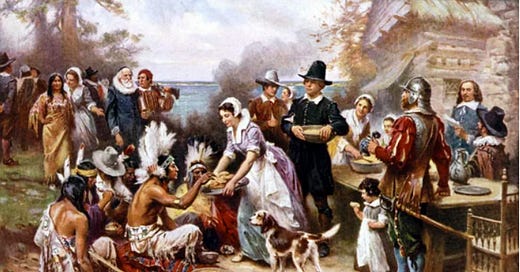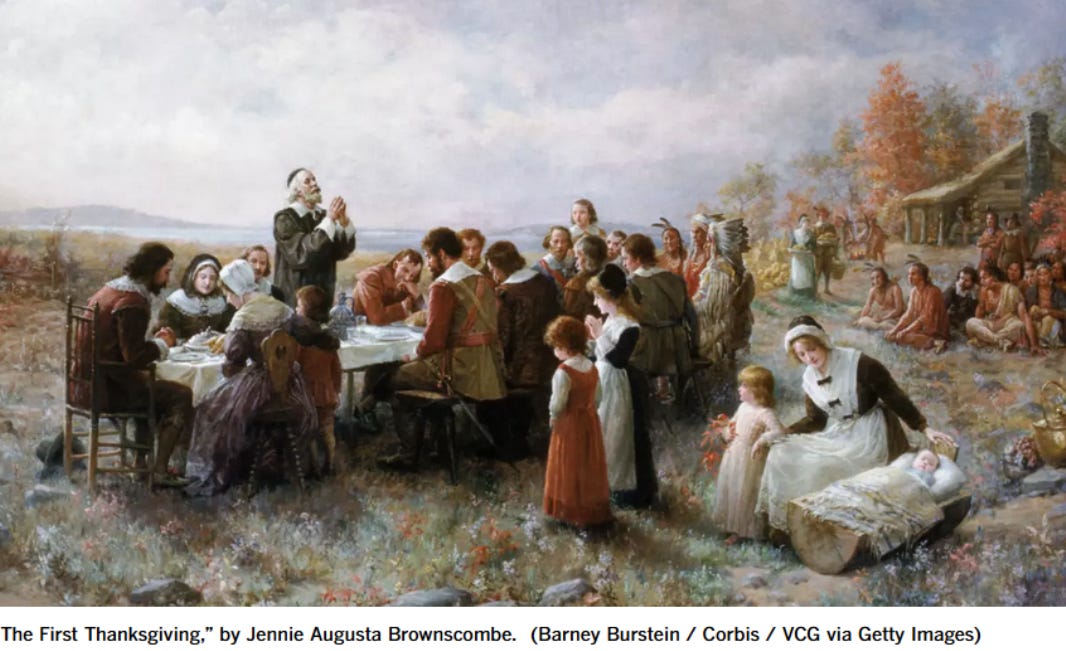HAPPY THANKSGIVING 2024: History of the First Thanksgiving! What Did the Pilgrims Eat on the First Thanksgiving?
The first Thanksgiving was a harvest celebration held by the pilgrims of Plymouth colony in the 17th century. I hope you have a fantastic Thanksgiving celebration! ♥
November 28, 2024
The first Thanksgiving was a harvest celebration held by the pilgrims of Plymouth colony in the 17th century.
Many myths surround the first Thanksgiving. Very little is actually known about the event because only two firsthand accounts of the feast were ever written.
The first account is William Bradford’s journal titled Of Plymouth Plantation and the other is a publication written by Edward Winslow titled Mourt’s Relations.
What is known is that the pilgrims held the first Thanksgiving feast to celebrate the successful fall harvest.
Celebrating a fall harvest was an English tradition at the time and the pilgrims had much to celebrate.
The 53 pilgrims at the first Thanksgiving were the only colonists to survive the long journey on the Mayflower and the first winter in the New World.
Disease and starvation struck down half of the original 102 colonists.
These pilgrims made it through that first winter and, with the help of the local Wampanoag tribe, they had a hearty supply of food to sustain them through the next winter.
When Was the First Thanksgiving Celebrated?
Although the modern-day Thanksgiving feast takes place on the fourth Thursday of November, the first Thanksgiving did not.
This feast most likely happened sometime between September and November of 1621.
No exact date for the feast has ever been recorded so one can only assume it happened sometime after the fall harvest. The celebration took place for three days and included recreational activities.
Who Was at the First Thanksgiving?
Guests at the feast included 90 Wampanoag Indians from a nearby village, including their leader Massasoit.
One of these Indians, a young man named Squanto, spoke fluent English and had been appointed by Massasoit to serve as the pilgrim’s translator and guide.
Squanto learned English prior to the pilgrim’s arrival after he was captured by English explorers and spent time in Europe as a slave.
Neither Bradford or Winslow’s account indicate whether the Indians were actually invited to the celebration or how they learned of it.
Many historians have simply assumed they were invited. Edward Winslow’s account merely states:
“Our harvest being gotten in, our governor sent four men on fowling, that so we might after a special manner rejoice together after we had gathered the fruits of our labors; they four in one day killed as much fowl, as with a little help beside, served the company almost a week, at which time amongst other recreations, we exercised our arms, many of the Indians coming amongst us, and amongst the rest their greatest king Massasoit, with some ninety men, whom for three days we entertained and feasted, and they went out and killed five deer, which they brought to the plantation and bestowed on our Governor, and upon the Captain and others. And although it be not always so plentiful, as it was at this time with us, yet by the goodness of God, we are so far from want, that we often wish you partakers of our plenty.”
The names of the pilgrims present at the First Thanksgiving:
Attendees:
Women: Eleanor Billington, Mary Brewster, Elizabeth Hopkins, Susanna White Winslow
Men: John Alden, Isaac Allerton, John Billington, William Bradford, William Brewster, Peter Brown, Francis Cooke, Edward Doty, Francis Eaton [first name unknown] Ely, Samuel Fuller, Richard Gardiner, John Goodman, Stephen Hopkins, John Howland, Edward Lester, George Soule, Myles Standish, William Trevor, Richard Warren, Edward Winslow, Gilbert Winslow
Teenagers and Children: Mary Chilton, Constance Hopkins, Priscilla Mullins, Elizabeth Tilley, a maidservant name Dorothy, Francis & John Billington, John Cooke, John Crackston, Samuel Fuller, Giles Hopkins, William Latham, Joseph Rogers, Henry Samson Bartholomew, Mary & Remember Allerton Love & Wrestling Brewster, Humility Cooper, Samuel Eaton, Damaris & Oceanus Hopkins
Desire Minter, Richard More, Resolved & Peregrine White
What Did the Pilgrims Eat on the First Thanksgiving?
Many dishes served during modern Thanksgiving meals were not present at the first Thanksgiving. The colonists didn’t have potatoes, nor did they have butter or flour necessary for making pies.
The pilgrims hadn’t even built their first oven by the time of the first Thanksgiving. Cranberries might have been served but only for color or tartness, instead of as a sweet sauce.
Neither Bradford or Winslow’s writing reveals what was actually served at the first Thanksgiving meal, besides fowl and deer, but guesses can be made based on the types of food they often wrote about such as mussels, lobsters, grapes, plums, corn and herbs.
There is no actual proof that the colonists ate turkey at the feast either.
Turkey wasn’t even associated with the Thanksgiving holiday until an editor of a magazine called Godey’s Lady’s Book came across Edward Winslow’s writings about the feast in the 1840s.
When this editor, Sarah Josepha Hale, read Winslow’s writings, she decided to bring this historic celebration back to life.
Up until then, Thanksgiving was only a regional New England holiday and wasn’t celebrated across the country like it is today.
Hale began publishing recipes and articles about the feast.
Shortly after, in 1854, Hale heard about Bradford’s book, which had gone missing during the Siege of Boston in 1775 and resurfaced in the library of Fulham Palace in London that year.
Hale focused her attention on the brief sentence about the colonist’s hunt for wild turkeys that fall: “And besides waterfowl, there was great store of wild turkeys, of which they took many, besides venison, etc,” Bradford wrote.
Despite the fact that Bradford never stated they ate turkey at the Thanksgiving feast, Hale started publishing articles about Thanksgiving dinners with roasted turkey and the two became synonymous.
Many people believe Thanksgiving became a reoccurring celebration for the pilgrims.
Whether this is true or not is unclear. There are no other accounts of the pilgrims holding any more harvest celebrations after 1621.
It is possible that the feasts happened, but if it did it wasn’t recorded.
Why Is it Called Thanksgiving?
The feast celebrated by the pilgrims in 1621 was never actually called “Thanksgiving” by the colonists. It was simply a harvest celebration.
A few years later, in July of 1623, the pilgrims held what they called a “Thanksgiving.”
This was simply a religious day of prayer and fasting that had nothing to do with the fall harvest.
Over the years, the names of the two events became intertwined and by the late 1600s many individual colonies and settlements, began holding “Thanksgiving feasts” during the autumn months.
When Did Thanksgiving Become a National Holiday?
Continental Congress declared the first national Thanksgiving on December 18, 1777, and then in 1789, George Washington declared the last Thursday in November a national Thanksgiving as well.
These were merely declarations and not official holidays. Future presidents did not continue the Thanksgiving declaration.
Thanksgiving didn’t become a national holiday until Hale began writing letters to each sitting president starting in 1846.
She wrote letters to five presidents: Zachary Taylor, Millard Filmore, Franklin Pierce, James Buchanan and Abraham Lincoln asking them to declare Thanksgiving a national holiday.
Abraham Lincoln was the only president to listen and supported legislation making it a national holiday in 1863.
America was in the middle of its bloody Civil War at the time and Lincoln hoped the new holiday would unify the bitterly divided country.
The holiday was finally a success and Thanksgiving has continued ever since.
May this Thanksgiving be a time to cherish special moments with family and friends.
Wishing you a wonderful and blessed holiday!
Grateful to have a friend like you as we celebrate Thanksgiving.
I hope you have a fantastic Thanksgiving celebration! ♥
Share or comment on this article.
Your support is crucial in exposing fake news and in helping us defeat mass censorship.






Another lie? It’s always been the third Thursday and now it’s changed! Dam it never ends